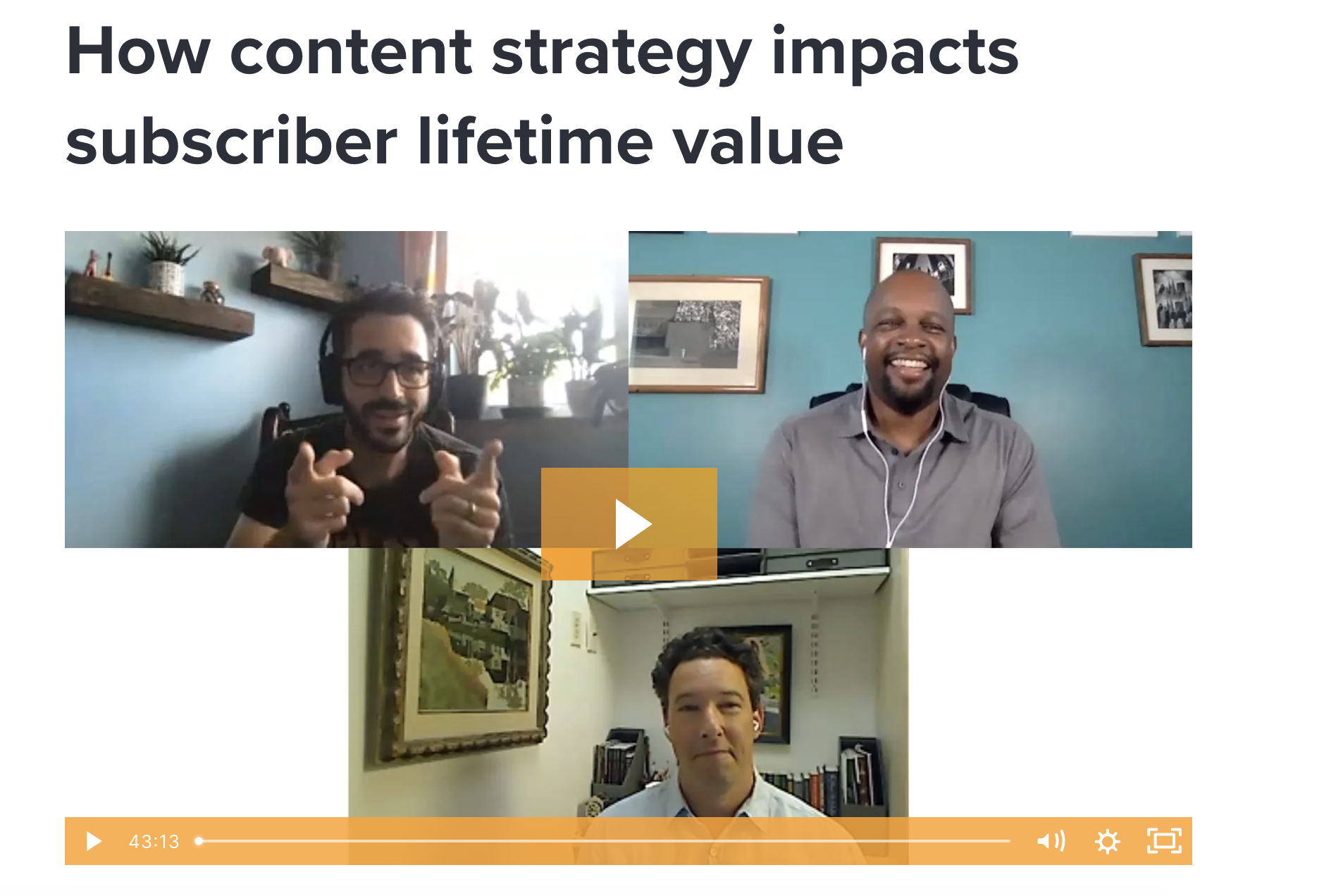Strategy
LiveIntent SVP of Marketing Kerel Cooper on How Brands Can Take a Stand and Back Up Their Words With Action
Kerel Cooper is not your average SVP of Marketing.
To start, he comes from an ad operations and customer success background. Less than four years ago, he was leading the account management team at LiveIntent. He’s also not afraid to speak his mind. In 2018, he and his good friend Erik Requidan started The Minority Report Podcast to create a platform where people of color, women, and LGBTQ individuals in marketing could tell their stories and have candid conversations.
Along the way, he’s also helped make LiveIntent one of the hottest companies in ad-tech. The company has raised over $65 million to help brands personalize their marketing and thrive in the pending cookie apocalypse. (Disclosure: LiveIntent is a Contently customer.)
In July, Cooper and I connected over Zoom to talk content strategy, Facebook boycotts, first-party data, and why brands need to take a stand and back up their words with action.
How have the last few months and this amazing movement for racial and social justice impacted the podcast?
When Erik and I started the podcast, we made it a point to say that we wanted quality over quantity. We weren’t sitting there thinking like, “Okay, we need to get a million downloads or a million subscribers in the first year.” It was like, “Let’s figure out how to have quality people on the podcast to tell great stories. And if we do that, the traffic, the plays, the downloads, all that will come.”
What’s been interesting is that we’ve already had more downloads and plays in 2020 than we had all of 2019. We’ve seen 103 percent growth year over year. It’s also opened up the door for Erik and me to have people give us a call and to ask our thoughts on what’s going on or certain things that individuals may be trying to do within their own organization. All in an effort to make sure we are using this moment in time to further DEI (diversity, equity, and inclusion) initiatives.
What role has content marketing played for you at LiveIntent?
It’s huge for us and plays a key role in our marketing strategy. It’s a lot of what we do on the marketing side. When we look at what’s important to us from a solutions perspective—monetization, advertising, identity—all of our content is based off of those three pillars.
We have a webinar series that we do right now called Real Time Banter. It was weekly, but we’re moving to bi-weekly for the summer. It gives us an opportunity to talk to publishers and brands, and connect with them on topics that are most relevant for them.
Are there any other formats that you’ve been experimenting with that have been really effective for you?
Video. Our VP of marketing, Nick Dujnic, does an awesome video series called LiveIntentional where he takes a topic in the industry and does some lighthearted content around it. So yeah, video and then written content as well. We leverage our weekly marketing and product marketing newsletters as the main vehicles to distribute the content.
Awesome. I think that ad tech has always been one of the early adopters of content marketing because it had to create a lot of content to just explain the industry to people. In the early days, it was just blog posts and whitepapers. It’s great to hear how you guys are developing real shows and series around it, and taking that to the next level.
One thing that’s important to note, especially as a B2B marketer, is that some of these tactics are good externally and internally.
Internally, our number one customer is our sales team and the account management team. We create these destination pages where our sales and account management teams can get updated on our different solutions as well as being able to take them through courses so they know how to speak about our solutions properly in the marketplace.
Then there’s the external content marketing and product marketing piece of it, where it’s a combination of thought leadership and educating our clients on how to get the best out of our platform and solutions set, which I think is just as important.
Amen. I agree with that so much. We’re putting our team through all of the different content strategy courses we’ve built because it’s a great way to get immediate feedback on what you created. “What’d you find interesting? What’d you find boring?” People who work with you are more likely to give you that honest feedback than a random reader.
I want to zoom out a little bit and talk about some of the broader conversations and trends in our industry. It seems this year every CMO is talking about the importance of empathy, authenticity, transparency, that sense of brand purpose in their marketing. But sometimes it feels a little bit hollow. So I wonder what you think those words and practices really mean in marketing?
A couple of years ago, I created a presentation on diversity in marketing. One point that I definitely hit on is this point around authenticity, and making sure that marketing messages feel real and they’re genuine and they’re not just sort of manufactured, or feel their culture jacking in any way, shape, or form.
As marketers, it’s part of our responsibility to make sure the values and beliefs that the organization has come through in the messaging, but are also backed with real action.
But I think what you’re seeing more and more now than you’ve ever seen before is that people not only want to buy quality products, but also want to buy products and services from companies that share similar values and beliefs. Those values and beliefs can be a number of different things. They can be social, they can be environmental, they can be racial, they can be political, etc. But I think you’re seeing that more now than ever before.
As marketers, it’s part of our responsibility to make sure the values and beliefs that the organization has come through in the messaging, but are also backed with real action.
The biggest story that connects to this in ad-tech right now is the Facebook boycott. A lot of large companies are saying, “Hey, we’re taking some action to back up some of what we’re saying around what we think is right and what we think is wrong.” Do you think it can last? Can brands actually keep themselves out of Facebook’s ecosystem over the long-term?
Well first, I think it’s great to see brands taking a stand because, as an organization, if you have certain values and beliefs, you should not only hold your employees up to those standards, but you should also hold companies that you partner with to those same standards. And if those standards aren’t being met, then you should address that. That’s part of what we’re seeing going on here today.
We’re not a huge brand, but we’ve actually made the same decision and we’ve pulled our budget from Facebook as well. With that said, it will be interesting to see what the long-term effect or impact is, and what major brands decide to do.
Because let’s not forget the reason why brands spend so much money on Facebook, their audience is there, the frequency and reach is there. You’ve got a massive, massive, massive logged-in environment too. Which lends itself to great performance.
One of the things that more and more brands and publishers need to do—and we’re starting to see this, especially with Google’s Chrome announcement and the death of the third-party cookie coming—is focus on your owned and operated. Focus on building up your own first-party data. Focus on your first-party strategy so that you can begin to take back and control your own destiny a bit more.
For a lot of brands, the idea of really taking control of that level of first-party data just feels like a huge, daunting task. A lot of marketers just feel like they’re swimming in the sea of data that they have compiled over the last decade.
They’ve been promised from damn near every tech vendor in one of those horrifying Scott Brinker Lumascapes that “this is going to be the data that unlocks everything for you.” Now we’re sitting here with all this data from disparate sources and no idea what to make of what.
You touched on something interesting there, and I don’t think that there’s going to be a magic bullet. No one company or solution is going to solve it for a brand.
The clock is ticking on the death of the third party cookie. Whether publishers and brands want to face up to that or not, I don’t think they’re really going to have a choice.
One of the first steps as an organization is: How do you start to wrap your arms around just what you have and answer the question, how do you get to a point where the data that you do have is actionable? Actionable can mean a number of different things, right? Monetization, utilizing it for selling your own products and services, and even utilizing it for personalization of content too.
The clock is ticking on the death of the third party cookie. Whether publishers and brands want to face up to that or not, I don’t think they’re really going to have a choice.
The clock is ticking on the death of the third party cookie. Whether publishers and brands want to face up to that or not, I don’t think they’re really going to have a choice.
You’ve talked about how your investment in content is ramping up, especially this year. We can’t do trade shows, can’t do in person events. Do you see that accelerating?
In full transparency, we work together, our two companies, LiveIntent and Contently. So we leverage the staff at Contently to help us with the content we produce because we can’t handle it all in-house. And I think that that’s going to continue to ramp up.
Going back to those pillars that I talked about earlier around advertising, monetization, and identity solutions, we’re going to continue to pump out content in those areas, whether it be written blogs, whether it be video content that we produce, or other forms of content like e-books and white papers. And we’re certainly going to leverage the great writing resources that we have at Contently to help us with that.
Last question—the hot seat question. What’s one piece of advice you’d give young marketing leaders who are looking to make a real impact?
Diversify your knowledge within marketing. Marketing is such a wide range of different topics, expertise, and positions.
The more you can grow your knowledge—whether that be in product marketing, content marketing, PR, demand gen, creative, and branding—the more well rounded you are as a marketer, the more doors that open up for you as you continue on in your career. It gives you more flexibility to move between consumer marketing and B2B marketing and other positions as well.
Don’t pigeonhole yourself into just one track of marketing. Try to learn and be as knowledgeable as possible in many different areas as you can.
Get better at your job right now.
Read our monthly newsletter to master content marketing. It’s made for marketers, creators, and everyone in between.





